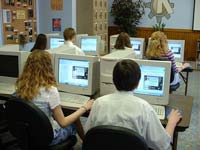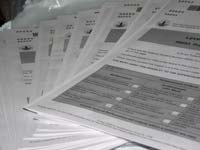![]() It’s a familiar scene – the wee hours of the morning are ticking away and your head is bent over a stack of notes, desperately trying to cram as much knowledge into your head before the test in the morning.
It’s a familiar scene – the wee hours of the morning are ticking away and your head is bent over a stack of notes, desperately trying to cram as much knowledge into your head before the test in the morning.
 Because of the way our education system works, this process of hard studying has become almost synonymous with the act of learning, and the inevitable tests and exams that bookend this ordeal merely assess how much information has stuck.
Because of the way our education system works, this process of hard studying has become almost synonymous with the act of learning, and the inevitable tests and exams that bookend this ordeal merely assess how much information has stuck.
But a new study reveals that the tests themselves do more good for our ability to learn that the many hours before them spent relentlessly poring over notes and textbook. The act of repeatedly retrieving and using learned information drives memories into long-term storage, while repetitive revision produced almost no benefits.
Studying vs. testing
To separate the effects of studying and testing on memory, Jeffrey Karpicke from Purdue University and Henry Roediger III from Washington University in St Louis set a group of local university students to a simple learning exercise.
At first, all of them were asked to study 40 pairs of English words and their Swahili equivalents, such as boat and mashua and were then tested on each pair to see how many they could remember. The students were then split into four groups who were put through three more rounds of studying and testing but with important differences.
For Group 1, the three further rounds were exactly like the first. For Group 2, any recalled pair of words were dropped from the study lists but were still tested. Group 3 faced the opposite condition – their correct answers were dropped from the subsequent tests but they were still asked to study them. And finally, Group 4’s correct answers were omitted both from later study sessions and later tests.
 This fourth situation most closely mirrors what conventional wisdom tells us to do. Once something is learned, that’s the end of the story and our attentions should focus on trickier facts that haven’t been so amenable to memory.
This fourth situation most closely mirrors what conventional wisdom tells us to do. Once something is learned, that’s the end of the story and our attentions should focus on trickier facts that haven’t been so amenable to memory.
After four rounds, the students had done an almost perfect job. Almost all of them remembered almost all of the 40 word pairs and all four groups picked up the words at the same rate.
Testing times
The successful students were sent away, but Karpicke and Roediger reconvened them one week later for a final test of their rudimentary Swahili vocabularies. All the students from the four groups had predicted that in a week’s time, they would remember about half of the words they had learned. But the reality was very different – two of the groups achieved much higher scores than the others.
Repeated testing was the critical factor. The first two groups were repeatedly tested on all the word pairs regardless of whether they successfully remembered them or not. A week later, they still remembered 80% of the words they had learned and Group 2, who didn’t have to study words they correctly remembered did just as well as Group 1, who had to pore over the full lists.
Students in the last two groups were not tested on words once they had remembered them correctly once, and they suffered for it. After a week, they remembered only about a third of the 40 pairs. Even Group 3, who repeatedly studied every pair in every study period fared much worse in the long run than Group 2, who studied selectively but were tested comprehensively.
 The study’s results are as amazing as they are counter-intuitive. They showed that where long-term memory is concerned, the act of repeated studying brings essentially no benefits, especially once a piece of information can already be dredged up from memory. Repeated testing, on the other hand, is of paramount importance, even for facts that can already be successfully recalled.
The study’s results are as amazing as they are counter-intuitive. They showed that where long-term memory is concerned, the act of repeated studying brings essentially no benefits, especially once a piece of information can already be dredged up from memory. Repeated testing, on the other hand, is of paramount importance, even for facts that can already be successfully recalled.
Implications
If this seems like an obvious conclusion in retrospect, consider the fact that the students themselves were unaware of it. All of them predicted that they would score about 50% in the final test where in fact, the average scores were either substantially higher or lower.
Indeed, surveys have shown that very few students use self-testing as a strategy for revision. When they do, it’s more to work out what they have or have not learned rather than as an active part of the process. And once they have successfully memorised something, they tend to drop it from further practice.
Karpicke’s and Roediger’s study makes a case for tests and exams to move away from their crude use as assessment tools. Currently, they are stressful and high-stakes affairs, deployed at the end of academic terms to mark an endpoint of the learning process. Perhaps, if they were used in a more continuous and informal capacity, they could actually contribute too.
Photos by Gabriel Pollard, Michael Surran and Milford
Reference:Karpicke, J.D., Roediger, H.L. (2008). The Critical Importance of Retrieval for Learning. Science, 319(5865), 966-968. DOI: 10.1126/science.1152408
Filed under: Learning and memory, Mind and Brain, Psychology | Tagged: exams, learning, memory, Psychology, recall, science, studying, testing |











But what about hands on practice? Does this not reinforce learning in much the same way as or even better than testing? As I recall from college, some students simply don’t do well with testing and, as a result, they lose confidence in their ability to learn. This can have a spiraling effect for the worse I would think. I’m sure there must be studies to this effect, though, I’ve not looked into it. Still, you wrote an interesting piece here … this will make me consider my own study (test prep) methods for the future even for those professors who did not rely on a great number of tests!
Re: I’m not sure how these results would generalise away from facts/figures (so-called “declarative memory”) to more physical skills (aka “procedural memory”), which I would assume to work through different means.
Re: testing and confidence. Yes I agree, but I suggest that a significant part of that effect would be due to the fact that tests are almost always used to work out how much you have already learned rather than to aid learning itself.
[…] Testing good for learning https://notexactlyrocketscience.wordpress.com/2008/02/17/testing-not-studying-makes-for-strong-long-t… […]
Ed, your point is a valid one, no question about it. I know, for example, at the university that I attended (Tufts University), there is great debate about the use of other means “to assess” learning (as stated in your last paragraph) rather than testing alone. College should, at least in my opinion, reinforce learning strengths and memory skills!
Thanks for a great blog, I’ll be back often!
[…] Testing, not studying, makes for strong long-term memories « Not Exactly Rocket Science […]
[…] this really news? It was a jarring reminder to me. Ed at Not Exactly Rocket Science (just before his blog was swallowed up by the many-tentacled Seed M…. But a new study reveals that the tests themselves do more good for our ability to learn that the […]
[…] “Testing boosts memory, study doesn’t” A study reported last month in Science is being discussed around the blogosphere under titles like “Testing boosts memory, study doesn’t,” and “Testing, not studying, makes for strong long-term memories.” […]
Ed,
I think you need to look again at the study. The abstract alone tells me that you’ve oversimplified the matter. It does not talk about “testing”, but “retrieval practise”. Yes, the study does use testing as its context for retrieval practise, but that does not mean that all tests are useful as retrieval practise or that all retrieval practise is testing.
Overinterpretation like this is very dangerous, as it leads to exaggerated trends in teaching. Teachers pick up on a fad, and try to alter every activity to match the buzzword, but don’t make the actual change suggested by the research.
In this case, the teachers might pick up on the word “test” and interpret it as “silent lone-working with marked results” — because really that’s what “test” means. They then simply take their existing material and add a marking scheme and present it as tests, and mark it as such. They’ll then see marks go down instead of up and reject the research. As a result, this very valuable research will be cast aside because people tested something that it *didn’t say*.
At high school I had a teacher who hated tests, but he engaged in some of the most rigorous retrieval practise I have ever experienced. He’d revise entire sections of the syllabus by asking, prompting and (if necessary) hinting. All this without us looking at books, and often without writing anything on the blackboard. And that was the first 10 minutes of practically every class.